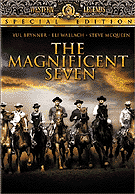The Magnificent Seven (1960)
| It is oddly appropriate that John Sturges’ The Magnificent Seven is an Americanized remake of Akira Kurosawa’s masterful Japanese epic The Seven Samurai (1954). The Seven Samurai had not only been largely inspired by American Westerns, but its popularity in the U.S. helped to revitalize the Western genre in the late 1950s and throughout the 1960s. While Sturges’ film does not compete with Kurosawa’s in terms of either visual dexterity or thematic complexity, it is still a rousing adventure story that not only includes a brilliant cast, but explores some of the deeper contradictions of the mythic noble outlaw that was so endemic to the American Western genre. The majority of The Magnificent Seven is set in Mexico, where a peaceful village of farmers is under constant threat from a vicious bandit named Calvera (Eli Wallach), who rides in from time to time with his gang of forty strong and steals the village’s food and supplies, leaving them barely enough to survive. Finally fed up with living under Calvera’s thumb, several of the villagers go north to Texas in order to find guns for hire who will come down and help them fight. The first man they convince to help them is Chris (Yul Brynner), a wandering Cajun gunslinger with a conscience and a strong sense of nobility. He teams up with another gunslinger named Vin (Steve McQueen), and together they slowly assemble a group of desperate men who nonetheless cling to some vestiges of honor in a world that is quickly modernizing and making their kind scarce (this theme would be taken to its logical extreme in Sam Peckinpah’s 1969 masterpiece The Wild Bunch). The final group also includes Britt (James Coburn), O’Reilly (Charles Bronson), Lee (Robert Vaughn), and Harry Luck (Brad Dexter). Lastly there is Chico (Horst Buchholz), a young, would-be gunfighter whose role was played in the The Seven Samurai by the great Toshiro Mifune. Chico is naive and high-spirited, with more machismo than brains, yet he also represents the future. Buchholz plays Chico with energy and a sense of comedy, but he does not bring to the role the kind of comic sadness that made Mifune so poignant and hilarious in Samurai. The first half of the film details how Chris and Vin put the group together--the formation of “The Magnificent Seven”--while the second half deals with their battles against Calvera. There are two climactic battle scenes between Calvera’s men and the villagers led by the seven gunslingers. Director John Sturges, who had extensive experience directing both action films and Westerns such as Bad Day at Black Rock (1955) and Gunfight at the OK Corral (1957), stages these battle with simple efficiency. They are not as visually compelling as either Kurosawa’s work or what Peckinpah would bring to the genre 10 years later, but they are exciting and well-paced, with a strong sense of urgency and a clear notion of what is at stake. Throughout The Magnificent Seven, Sturges displays his keen sense of efficiency; there is not a wasted frame or line of dialogue in the whole film. This ensures a quick pace and maximum audience involvement, yet it sacrifices some of the more subtle humanistic qualities that set The Seven Samurai apart. Sturges relies largely on his talented cast of then-unknowns (Brynner, who had won the 1957 Oscar for The King & I, was the only true marquee star) to carry the film’s thematic burden. You can see why these men were cast: All of them have unique, memorable faces that convey both conviction and desolation. They play men who have come to the end of their ropes, and all they have left to do to salvage their nobility is to protect a poor village of farmers. Harry Luck’s insistence, even with his dying breath, that there were hidden riches in the hills around the village is testament to their desperation. Yet, all of them attain greater heights of humanity by sacrificing themselves in a just cause. In playing Calvera, Eli Wallach does an excellent job of conveying how closely associated he is with the members of the Magnificent Seven. After all, they are all gunslingers and outlaws; the only obvious difference between them is which side of the line they stand on in this particular situation. This makes the film much more complex than it first appears, as it becomes increasingly difficult to draw simple distinctions of good and evil. We naturally want to side with the Magnificent Seven, yet we are constantly reminded that they are criminals with no ties to land, family, or nation (something that was always true of Western heroes, but never consciously explored). Yet, at the same time, there is something about the conviction and determination of the seven men to help protect the village that assures us there is at least some difference between them and men like Calvera. One of the key moments comes when one of the Mexican villagers assumes that all the outlaws care about is the money. Chris quickly puts him right by saying, “Men in this line of work are not all alike. Some care about nothing but money; others, for reasons of their own, enjoy only the danger.” It is that moment more than any other in the film that makes you realize the importance of individual humanity, even among gunslighers. They may all be outlaws and killers, but they are not all the same.
Copyright © 2001 James Kendrick | |||||||||||||||||||||||||||||||||||||||||||||
Overall Rating: 


 (3.5)
(3.5)


